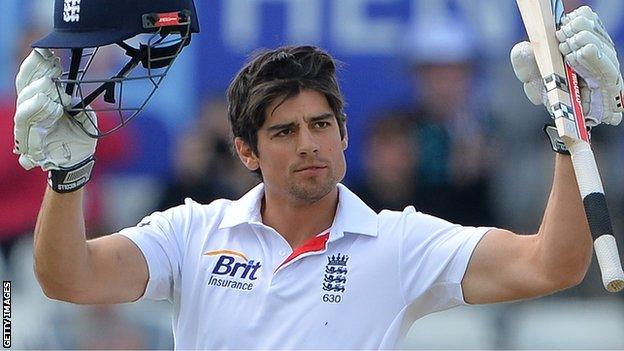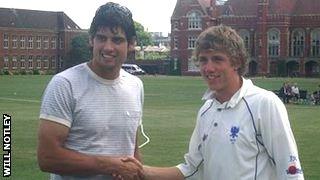Ashes 2013: Alastair Cook - making of an England batting great
- Published
- comments

When Alastair Cook's prowess as a choirboy won him a music scholarship to Bedford School, his brief was to sing rather than to bat.
But all that changed one summer's day in 1998 when Marylebone Cricket Club turned up for a match against the Bedford first XI one player short.
Fourteen-year-old Cook, already a promising club cricketer, was drafted in as an emergency replacement and proceeded to score a century.
The innings was the harbinger of a prodigious talent that saw him go on to shatter Bedford's batting records, establish himself in the Essex first team at the age of 18 and as an England opener at 21.
Now, as he prepares to captain England in the Ashes against Australia, which start on Wednesday, it is fascinating to go back to Cook's school years - before the 7,524 Test runs, the 25 centuries and the countless accolades - to examine the evolution of a modern-day batting great.
During those prolific years at Bedford, the best seat in the house was reserved for Will Notley, Cook's partner at the top of the batting order.
Notley picks up the story from the aftermath of the MCC match, when Cook was immediately promoted to the first XI, which meant competing against boys four years his senior.
"He was a lot smaller back then and a lot slighter," explains Notley. "He wasn't 6ft 2in like he is now and he got a lot of grief because he struggled to hit the ball off the square.
"But what he lacked in strength he made up for in temperament. He was quite unflappable and as a 14-year-old playing against 18-year-olds you have to have some pretty good concentration.
"He's always been good off the back foot, so he is at home cutting and pulling. All the 18-year-olds would try to bounce him out and he would just hook them for four."
One of Cook's greatest attributes is his ability to score heavily in sweltering conditions. Reputed to sweat less than any other member of the England team, five of his six highest Test scores have come in Brisbane, Kolkata, Sydney, Ahmedabad and Chittagong.
As Notley explains, Cook's ability to thrive in the heat was in evidence when they played together at a tournament in Barbados at the age of 15.
"Cooky batted well through the whole competition, scored a couple of hundreds and kept his concentration amazingly well in quite intense heat," says Notley.

Cook unfurls his trademark sweep shot for Bedford School in a match at Stowe in 2002
"He puffed and panted like the rest of us, but he had a determination not to get out, just like he does now."
By the time Cook reached the sixth form, he was a member of the Essex Academy and being groomed for life in professional cricket.
Every morning, Bedford coach and former England batsman Derek Randall would get on the first train from Nottingham to run fitness sessions and bowling machines with his protege before breakfast.
Meanwhile, out in the middle, Cook - with Notley in his slipstream - was starting to go through the gears.
In the lower sixth, he scored more than 1,100 runs, including five consecutive hundreds, and was picked out in Wisden as "one to watch". The following summer, his tally of 1,287 included two double hundreds and broke a school record that had stood since the early 1980s.
Over the two years, Cook and Notley's average opening partnership was 126. Their finest hour came in the upper sixth against Gordonstoun - another independent school renowned for sporting achievement - when they batted for the full 50 overs to put on 333, a record opening stand in schoolboy cricket at the time.

Cook (left) and Notley pose proudly in front of the scoreboard depicting their record opening stand
During the partnership, which saw Cook finish on 206 and Notley 111, Cook revealed a trait that has characterised many a great batsman - greed.
"Cook scored almost double the runs I got against Gordonstoun, but part of the reason was that he farmed the strike so well," recalls Notley.
"There was a period in the middle of the innings where he had five consecutive overs. I faced nothing in that period and eventually stopped talking to him between overs as a kind of friendly protest.
"We started talking between overs again once we went through 300 though, which also brought up my century."
Inevitably, there were times when Notley failed to stay the course and simply had to marvel at the blend of mental strength and technical skill that have served Cook so well in an England shirt.
"We could be three down for not many, chasing 280, and he would steer it through, scoring 150 to win us the game," he adds.
"He did it so often that we always knew he was going to go on, but to reach the level he has now, we couldn't predict that."
Away from the cricket field, Notley describes Cook as "one of the boys" who would enjoy a beer and "dossed around in economics lessons like the rest of us".

Cook congratulates James Kettleborough on breaking his Bedford runs record
After leaving school with three A-levels, Cook was drafted straight into the Essex first team, while Notley went to university to read architecture.
The pair have remained close friends, occasionally meeting up after Cook's matches in London or at old boys' functions at the school.
In 2010, Cook even made a special trip to Bedford between Test matches to congratulate James Kettleborough as he eclipsed Cook's own school record. "Even though he had 4,500 Test runs at the time, I think he was secretly quite annoyed that it had been broken," says Notley.
Kettleborough, 20, made his Northants debut this season after signing from minor county Bedfordshire.
As for Cook's former accomplice Notley, he recently qualified as an architect and plays for Hornsey Cricket Club in north London at weekends.
Having long given up hope of following his friend into professional cricket, he still dines out on his schoolboy exploits with the England skipper.
"I think I outscored him 10 times and I certainly get a lot of pleasure from telling the lads that," he says. "Mind you, the way I've been batting this season, I think they are beginning to wonder if I made it all up."
Live radio commentary from Test Match Special (TMS) on the Ashes will be available on BBC Radio 4 LW and BBC Radio 5 live sports extra, the BBC Sport website and via the BBC Sport app and iPlayer radio app.
- Published6 December 2012
- Published6 December 2012
- Published2 July 2013